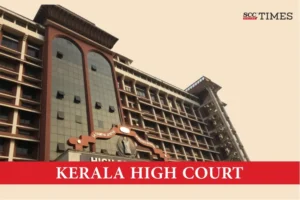Kerala High Court: In a petition filed to declare that the petitioners fall within the age limit prescribed under Section 4(c) of the Surrogacy (Regulation) Act, 2021 (‘the Act’) and direct Respondent 3 to issue the eligibility certificate for surrogacy to the petitioners, C.S. Dias, J., stated that the terms ‘between’ and ‘to’ used in Section 4(c)(I) of the Act reflected a restriction indicating that a female could have a surrogate child only after attaining the age of 23 years and before completing the age of 50 years, with a similar restriction for males aged between 26 to 55.
Thus, considering the facts and legal principles, the Court stated that Respondent 3 had rightly concluded that the wife was ineligible for an eligibility certificate under Section 4(c) of the Act since she had attained the age of 50 years. Consequently, the petitioners’ prayer to declare the wife eligible for an eligibility certificate was rejected.
Background
In the present case, Petitioner 1 was the wife of Petitioner 2 (‘husband’). Wife was born on 21-06-1978 and was of 46 years of age, while the husband was of 52 years old. The petitioners were issueless. Both husband and wife underwent several cycles of treatment utilising the Assisted Reproductive Technology, but did not yield the expected results. Hence, they were eligible to avail surrogacy services. They also identified a surrogate mother, who had consented to assist them in conceiving a child.
The jurisdictional Magistrate had passed an order declaring that the parentage and custody of the child born through surrogate mother would vest with the petitioners. Accordingly, the petitioners approached Respondent 3 for an eligibility certificate as provided under Section 4(c) of the Act. However, Respondent 3 had orally declined to issue the eligibility certificate because the wife had attained 50 years.
Thus, the petitioners filed the present petition.
Analysis, Law, and Decision
The Court stated that the law had crystallised that a person attains a specified age on the day preceding his birthday anniversary. In light of the interpretations under Section 4 of the Indian Majority Act, 1875, there was no doubt that a female who attained the age of 23 would become eligible to have a surrogate child and becomes ineligible on the preceding day her 50th birthday anniversary.
The Court stated that the terms ‘between’ and ‘to’ used in Section 4(c)(I) of the Act reflected a restriction indicating that a female could have a surrogate child only after attaining the age of 23 years and before completing the age of 50 years, with a similar restriction for males aged between 26 to 55.
The Court stated that if the petitioners’ contention was accepted, the minimum age limits would be stretched to the previous days of the 24th and 27th birthday anniversary, and the maximum ages would be extended till the preceding day of the 51st and 56th birthday. The Court stated that it was not for this Court to extend the age limits fixed by the legislature by exercising its extra-ordinary jurisdiction. It was reasonable to presume that the legislature had imposed these age restrictions, considering the normal age that women conceived a biological child. If the petitioner’s interpretation was accepted, it would extend age criteria set forth in various statutes, particularly in-service law, by an additional year. Furthermore, the petitioners had not challenged the vires of the age fixation in the Act.
Thus, considering the facts and legal principles, the Court stated that Respondent 3 had rightly concluded that wife was ineligible for an eligibility certificate under Section 4(c) of the Act since she had attained the age of 50 years. Consequently, the petitioners’ prayer to declare the wife eligible for an eligibility certificate was rejected. Accordingly, the writ petition was dismissed.
[Rajitha P.V. v. Union of India, 2025 SCC OnLine Ker 907, decided on 13-02-2025]
Advocates who appeared in this case:
For the Petitioners: Adithya Rajeev, S. Parvathi, Safa Navas, Advocates.
For the Respondents: R.V. Sreejith, Advocate.

